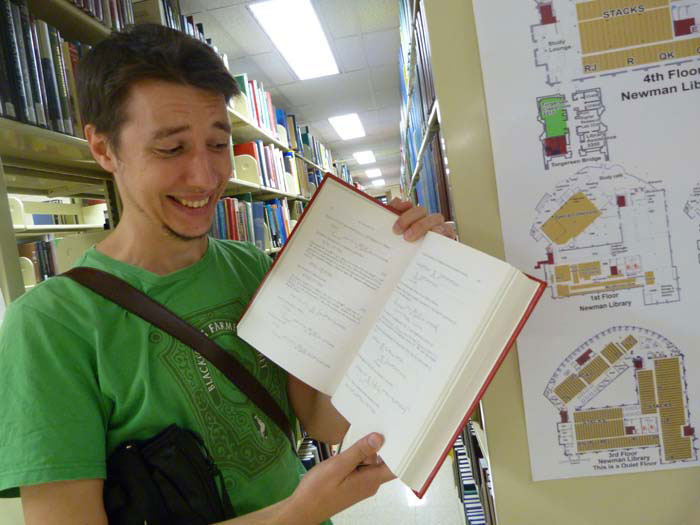Jen Stevens is the Humanities and Social Sciences Librarian at George Mason University and a consultant for Mason’s Writing Across the Curriculum Faculty Senate Committee. She has extensive experience assisting undergraduate and graduate student writers discover new resources and information in their research process. For her information and current InfoGuides, click here!
In my work as a Humanities and Social Sciences Librarian at George Mason University, I work with faculty members and their students to help the students learn how to do better research, which in turn leads to better writing.
Last week, I found the strangest thing in the Fenwick Library Reference area. . .
It was an envelope that was binder clipped onto one of our reference books. The envelope was marked with the name of one of the courses that we offer at Mason; inside were several small pieces of paper, each with an identical cryptic line that allowed students to make progress in an word game. My best guess is that the envelope was part of some kind of “Library Scavenger Hunt” assignment. The classic library scavenger hunt is a list of “things” that students have to go find or get. Sometimes it’s a specific book or journal article, information from a reference book, or even the photograph or signature of a librarian. In this case, the assignment was that bit of paper. The primary goal for such exercises is to just get the students into the library; however, many professors believe that answering the questions and accomplishing the tasks will help students develop their research skills.
The instructors who use these assignments mean well. They want their students to learn to do better library research, and they want students to know what resources the library has and how to find them. These are excellent, important goals that my library colleagues and I want to support.
The problem is that the “classic” library scavenger hunt just doesn’t quite send the sort of messages that are really helpful to students in the long run.
Why not?
- In the classical library scavenger hunt, the emphasis is on the “right” answer rather than the process. Even though faculty are trying to teach the students a process, they will invariably focus on the outcome. I have even seen cases in which students circled the answers in reference books to help classmates who came after them!
- The questions or tasks in these classic examples usually aren’t connected to other assignments that the students are working on. There is probably a larger connection to the rest of an instructor’s syllabus, but students don’t necessarily see that. Instead, they may see the scavenger hunt as annoying busy work and resent spending the time finding resources.
- Often, in some of the examples I’ve seen, the questions seem to be arbitrary or based on outdated ideas about what libraries are. For instance, I have seen scavenger hunt assignments that required students to search physical card catalogs (ours went away years ago) or find an article in a print format journal (most of our journals are online now).
Too often, the takeaway for students is that libraries are annoying, frustrating places, full of drudgery rather than discovery.
In addition to my experiences as a writing instructor and librarian, my advice is informed by my experience as a student. As a student, I experienced many library scavenger hunts (the example of students circling the answers in reference books came from one of my own library school classes). And yes, we sometimes resented those assignments and finished (then forgot) them as quickly as possible.
So what would an ideal library assignment look like?
- It would be clearly connected to another assignment that your students are working on for your class. For instance, you might ask students to find a potential source for an upcoming research paper.
- It would be open ended. There would be no one “right” answer. One example would be to ask a student to find a book or article on the subject of their choice and then describe it. In fact, one of my favorite library assignments came from a science professor who gave his graduate students a list of journals and asked them to each pick three and examine them closely.
- It would be about process, not result. Ask the students to describe the process that they used to find a given book or article. What database did they use? What keywords did they try? How many searches did it take? Does the book or article that they found look useful for their paper? Why or why not?
The librarians at Mason (and on other campuses, too!) want to help your students learn to use the library effectively, so you may wish to contact a librarian at Mason or your home institution. Ask if you can sit down with him or her to plan a library assignment for your students that best suits your course and your students’ needs.
And please, no binder clips on the books!

